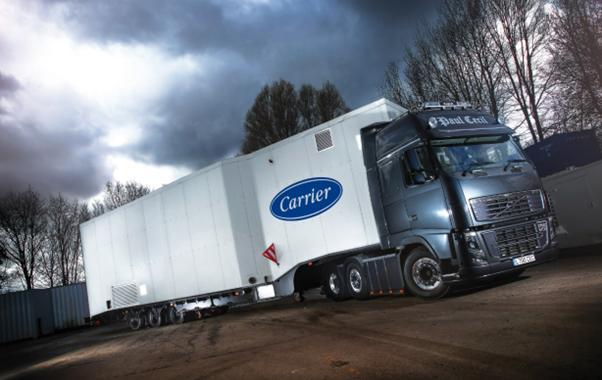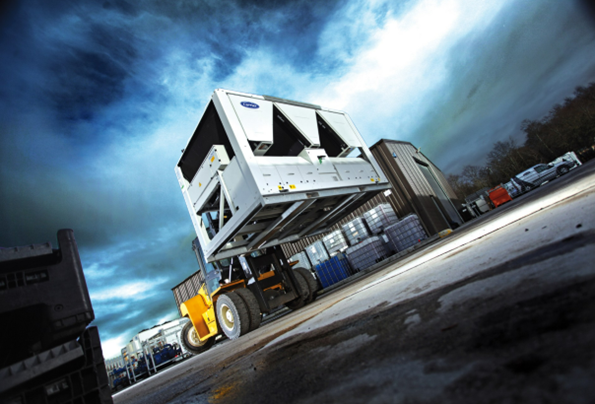Beyond the Hire: How Rental Solutions Fuel Business Resilience
LONDON, UK -
By Russell Boswell-Munday, Sales Director, Carrier Rental Systems UK&I and John Gallagher-Worthington, Sales Director, SLD Pumps and Power, both Carrier companies.
Rental solutions should form a critical part of a company’s business continuity strategy. Russell Boswell-Munday, Sales Director at Carrier Rental Systems UK&I, and John Gallagher-Worthington, Sales Director at SLD Pumps and Power, both Carrier companies, explain how a proactive approach can help businesses turn temporary solutions into lasting resilience.

Russell Boswell-Munday
Sales Director, Carrier Rental Systems UK&I, a Carrier company.

John Gallagher-Worthington
Sales Director SLD Pumps & Power, a Carrier company.
In uncertain times, businesses face an increasing number of risks: supply chain disruptions, extreme weather and energy market volatility, to name a few. Yet, many organisations still treat HVAC, power and pump rentals as a reactive measure, a short-term solution to an urgent problem. The reality is far more strategic. Temporary rental solutions are not just about plugging gaps, they are integral to long-term resilience planning, sustainability measures and cost-effective operations.
For industries that rely on HVAC, power and pumping systems, an unexpected failure can be catastrophic. According to data from Companies House, over 15,000 construction businesses ceased operations in the first ten months of 2024 , with more than 70% experiencing major weather-related delays, notably from extreme heat. Manufacturing plants facing a chiller breakdown, data centres experiencing power loss, or construction projects encountering unforeseen site conditions can all see productivity grind to a halt without the right contingency measures in place.
Yet, we frequently see businesses focusing on what to do when a ‘maximum failure’ crisis occurs, rather than planning ahead to mitigate potential risks. The truth is, having a robust contingency plan with rental solutions integrated into it can make the difference between hours of downtime and a seamless transition to an alternative system.
Emergency Response Vs Smart Planning
Unplanned outages can disrupt operations, damage reputations and result in significant financial losses. Yet, many businesses fail to recognise that a robust contingency strategy goes beyond having backup equipment on standby. It requires a holistic approach to risk management.
A good example is the increased frequency of extreme weather events affecting power infrastructure and HVAC performance. Flooding, heatwaves and storms can all disrupt operations, yet many businesses still rely on ad-hoc responses rather than structured contingency plans.
By integrating rental solutions into resilience planning, businesses can safeguard against the unpredictable. Temporary chillers, for example, can boost cooling capacity during extreme heat events to help meet cooling demand in environments such as data centres and healthcare facilities. Similarly, rental power solutions can mitigate risks associated with grid instability, ensuring uninterrupted operations in energy-intensive industries.
A well-thought-out contingency plan ensures that businesses have pre-arranged rental equipment specifications, logistical pathways and installation procedures. This level of preparedness can reduce reaction time in the event of an emergency. For instance, data centres rely on uninterrupted power supply systems to maintain server integrity, but without a pre-existing plan, even a brief outage could result in significant data loss and operational disruption. By working with a specialist provider in advance, businesses can have rapid-deployment solutions tailored to their exact requirements, ensuring operational continuity when it matters most.
Carrier’s rental experts act as strategic partners, helping businesses assess their risks, identify potential vulnerabilities and develop proactive rental strategies that ensure they are never caught off guard.

Temporary rental solutions are integral to long-term business resilience
The Business Case for Rental is More Than Just Cost Savings
The decision to hire rather than buy is often viewed through the lens of cost efficiency. While avoiding capital expenditure can be a clear advantage, the real value of rental solutions extends far beyond financial savings.
-
1. Access to Cutting-Edge Technology
Renting equipment ensures businesses are always using the latest, most efficient technology without the risk of obsolescence. HVAC and power solutions are evolving, and newer models contain more advanced technology which helps to improve their energy efficiency, reduce emissions and offer smart monitoring capabilities.
-
2. Flexibility and Scalability
Industries such as construction, live events and utilities require scalable solutions that can adapt to fluctuating demands. In the events sector, temporary cooling is often critical for maintaining ice integrity at seasonal outdoor ice rinks or ensuring climate control in large marquees and temporary venues. Meanwhile, utility providers may need rapidly deployable backup generators during maintenance shutdowns or emergency repairs. Temporary solutions give businesses the flexibility to scale HVAC and power support up or down as needed, without the cost and complexity of storing and maintaining idle equipment.
-
3. Risk Mitigation and Compliance
As regulatory pressures increase, particularly in emissions reduction and energy efficiency, owning equipment can create long-term compliance challenges. As an example, the introduction of low-emission zones and tighter restrictions on diesel-powered generators in urban areas are making some older equipment obsolete or non-compliant. Rental solutions ensure businesses can adapt to evolving legislation without major capital reinvestments.
-
4. Lifecycle Asset Management
Rental solutions can form part of a broader and more holistic asset management strategy, where a service agreement can predict when assets need maintenance or upgrading. The rental solution can seamlessly integrate to minimise operational downtime while the maintenance is being completed.
-
5. Temperature Control Emergency Planning Service
Carrier’s Temperature Control Emergency Planning Service (TCEPS) offers more than just a contingency against costly downtime. With tailored plans that offer rapid access to rental heating, cooling and steam solutions, TCEPS supports uninterrupted service delivery. It strengthens duty of care, safeguards reputations and ensures compliance, while enabling facilities managers and business leaders to proactively manage risk.
Sustainability and the Role of Temporary Solutions
Sustainability is a key driver for businesses today, with net-zero targets becoming an operational priority. While temporary solutions have traditionally been viewed as stopgaps rather than sustainable options, the rental industry has evolved to actively support decarbonisation efforts.
Inefficient, outdated HVAC and power systems can consume excessive energy, leading to waste and inflated emissions. By incorporating high-efficiency rental solutions into operations, businesses can help reduce their carbon footprint. Modern rental chillers utilise lower Global Warming Potential (GWP) refrigerants, while hybrid power solutions integrate battery storage and renewable energy sources to minimise diesel dependency.
For companies working towards net-zero targets, rental solutions offer a bridge between current infrastructure and long-term sustainable investments. Instead of replacing an entire fixed chiller plant with an immediate capital outlay, businesses can integrate energy-efficient rental solutions while planning for a permanent transition to newer technologies.
There is a growing demand for hybrid rental solutions that combine renewables with traditional power sources. Battery storage, solar integration and ultra-efficient generators are now viable rental options, enabling businesses to reduce emissions without compromising performance.
The Future of Rental
The landscape of temporary HVAC, power and pumping solutions is rapidly changing. Emerging technologies are driving improvements in efficiency, sustainability and reliability. Smart monitoring and reporting, AI-driven performance optimisation and predictive maintenance are becoming standard features in rental solutions, allowing businesses to operate with greater control and foresight.
As industries face increased regulatory scrutiny, rental solutions will play a critical role in helping businesses stay compliant without long-term financial risk. The ability to adapt quickly to new environmental standards without significant capital expenditure makes rental an attractive option for businesses seeking both flexibility and sustainability.

Temporary rental solutions are integral to long-term business resilience
A Smarter Way to Plan for the Future
Business resilience is not about reacting to crises; it’s about preparing for them. Temporary rental solutions should not be seen as a last-minute fix but as an essential component of a robust contingency strategy. By integrating temporary HVAC, power and pumping solutions into long-term operational strategies, businesses can achieve greater efficiency, sustainability and reliability.
It’s time to shift the conversation from short-term rentals to long-term resilience. At Carrier, through Carrier Rental Systems and SLD Pumps & Power, we are committed to helping businesses transition from reactive problem-solving to proactive resilience planning. When it comes to business continuity, there is far more to us than meets the eye.